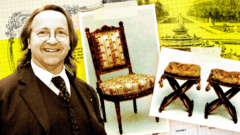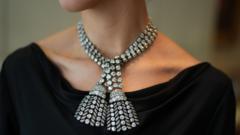Bill Pallot’s trial reveals how his incredible knowledge of antiques was leveraged to deceive some of the wealthiest collectors and institutions, exposing a dark side of the art world.
Art Expert on Trial for Fraudulent Antique Sales Linked to Prince and Versailles

Art Expert on Trial for Fraudulent Antique Sales Linked to Prince and Versailles
A prominent 18th-century furniture specialist faces charges for duping clients, including a royal and the Palace of Versailles, with counterfeit items.
Bill Pallot, a once-revered expert in 18th-century French furniture, is now standing trial in France for allegedly trafficking in counterfeit antiques. His deep-seated passion for this era's artifacts had established him as a prominent figure among museums, collectors, and notable establishments such as the Palace of Versailles.
However, Pallot’s rise in the art world took a nosedive after a former student, now skilled in the nuances of antiques to a remarkable degree, exposed him by detecting a taste for deception. His unique ability to discern authenticity, even through taste, played a crucial role in unveiling Pallot's misadventures.
Mr. Pallot’s extensive influence led to the classification of various pieces as national treasures by esteemed French authorities. He purportedly misled affluent collectors, including Prince Abdullah bin Khalifa Al-Thani of Qatar, into believing they were acquiring genuine artifacts with rich royal histories, such as chairs allegedly owned by Marie Antoinette and Madame du Barry.
His credibility in the field stemmed partly from his widely lauded publication, “The Art of the Chair in 18th Century France,” which featured a foreword by the renowned fashion designer and antique enthusiast Karl Lagerfeld. Today, Pallot is notorious not for his literary contribution but for his intricate web of deceit that ensnared respected antique dealers and buyers alike. The trial continues to unfold, revealing the complexities of trust, value, and authenticity within the art market.







